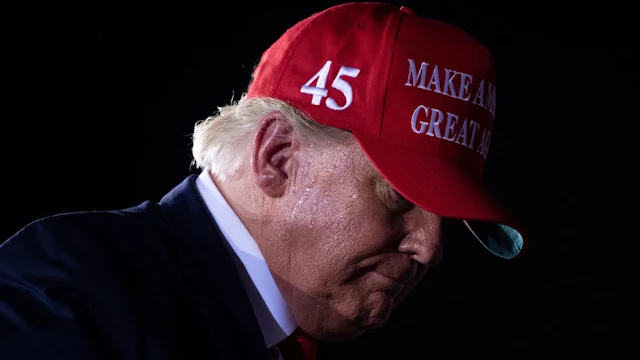Why can't a Donald Trump victory in November be ruled out?
The summer of 1988 is becoming fashionable due to what may happen in the complicated presidential elections that the United States will hold on November 3. In the heats of 32 years ago, following his party's convention in Atlanta, Democratic presidential candidate Michael Dukakis seemed destined to succeed Ronald Reagan himself in the White House. The governor of Massachusetts went on to accumulate a brilliant 17-point lead over his Republican rival Bush father.
That campaign served to confirm two things: the effectiveness of the dirty electoral game and that three months is an eternity in politics. In fact, in the elections held on November 8, Vice President Bush ended up winning in 40 of the 50 states of the Union, with an advantage of 53% of the popular vote compared to the 46% obtained by Dukakis and 426 electoral votes. Four years later, the veteran Bush, despite his impeccable credentials, was defeated by Bill Clinton thanks to an economic crisis and a conservative vote divided by another populist billionaire named Ross Perot.
This story of Bush Sr. and Dukakis is serving as a cold water jug for those who make the mistake of confusing the most recent polls with the results of the poll scheduled in just 60 days. It is true that Joe Biden, after the conventions turned into bad television and that have not served any of the candidates much good, maintains an advantage over the occupant of the White House of between 7 and 10 points.
But it is also true that the Presidency of the United States is decided in 50 different elections, without the constitutional need to add a majority of the popular vote.
That toxic summer of 1988
Recalling that intense summer of 1988, with the great challenge of filling Reagan's shoes, a select group of advisers to George H. W. Bush met in a downtown five-star hotel in Washington, D.C. In their hands they had ample and accurate documentation of the ignorance among the American electorate about Dukakis's progressive record as governor and the unpopularity of some of his hardly exportable policies beyond Massachusetts. And from there they began to build a counteroffensive plan.
As Lee Atwater, the legendary and toxic manager of the Republican presidential campaign, put it, the time had come to "strip the little bastard off the bark."
That campaign generated the closest thing to a first oversaturation in the United States of political consultants and consiglieri with a desire for prominence. In fact, Time magazine did not hesitate to proclaim that electoral cycle as The Year of the Handlers, due to the tight control exercised in both campaigns by a series of advisers such as James Baker and John Sasso.
Without missing the reproach that, a few weeks before the elections to elect the most relevant leader in American politics, the two candidates in the running had returned to a state of childish dependence on their advisers.
All this campaign manager overdose coincided with a visible refinement of the tools available to aspiring White House candidates. According to critical analysis in Time magazine: "Every four years, the modern campaign comes closer to mechanical perfection, as techniques such as focus groups and overnight follow-up polls bring the last gasp of spontaneity out of the process."
Reagan's Democrats
On the other hand, thanks to all these sophisticated methods, the Bush Senior campaign came to the conclusion that if it wanted to connect with an especially decisive segment of the American electorate known as the so-called Reagan Democrats - working-class voters who will make possible the hegemony of the Republican Party during the 1980s - issues related to the dreaded weakness of the United States in the international arena and the obsession with order and law on the domestic front had to be emphasized.
However, the great electoral offensive of the Bush Senior campaign was even more disturbing and thorny when it used the great American taboo of racial tensions. Republicans focused on a plan to grant prison permits in Massachusetts that began during Dukakis' tenure as governor. While enjoying his corresponding temporary release from prison, a violent black inmate named William Horton raped a Maryland woman and stabbed her fiancé.
Worst instincts
This event served as "inspiration" for a couple of questionable television commercials. The connotations of these reprehensible attack announcements are criticized even today for having toxicly appealed to the worst instincts of the electorate. One of them showed a line of prisoners leaving the jail through a revolving door without any respect or consideration for the rights of their victims. In another, the mugshot of "Willie" Horton was displayed, emphasizing the message that Dukakis as governor of Massachusetts was not a reliable leader in what Richard Nixon had coined more than a decade earlier as law and order.
Although these ads were viewed as a cheap blow of negativity and manipulation, Michael Dukakis' campaign response was not as convincing as he needed to overcome his backlash in the polls. Instead of defending his tenure as governor and his candidacy for president, Dukakis limited himself to denouncing the tactics of George H.W. Bush and did not take the opportunity to defend his own ideas for the United States government.
His limited response was based on an alternative series of ads titled The Packaging of George Bush. In these ads, Vice President Bush was presented as an artificial invention of his advisers within a campaign based exclusively on disqualifications.
Still, the great political lesson from Donald Trump is that he can be president without building a broad coalition of voters and without going through the toll of diversity that defines America. So this week Trump has taken his divisive show to Wisconsin, a state he won in 2016 by a seven-tenths margin over Hillary Clinton. He knows very well that to be an honorary astronaut you don't have to go to the moon.


